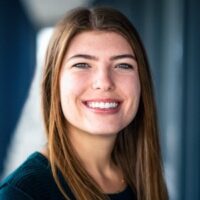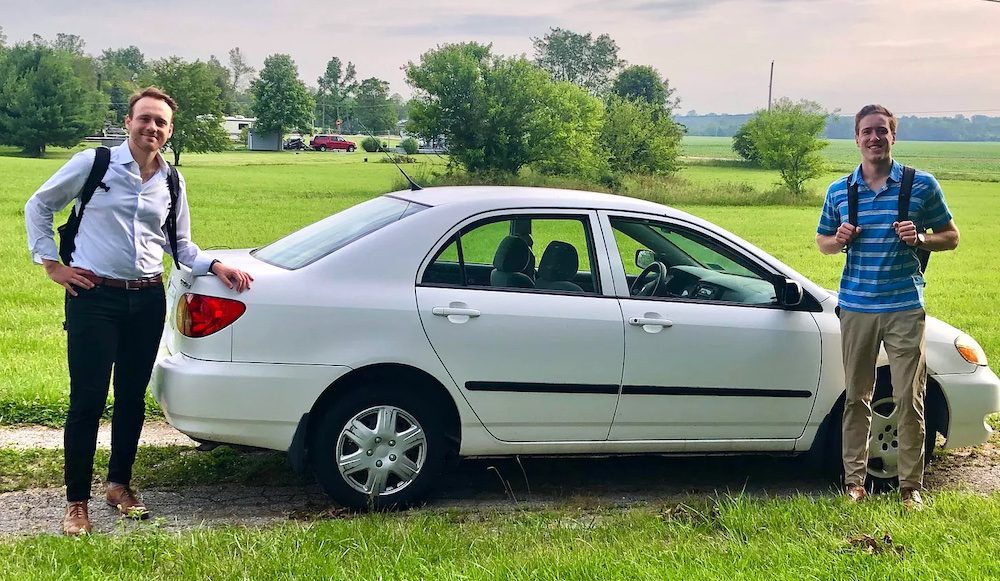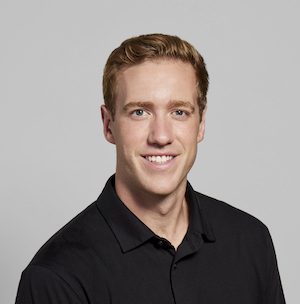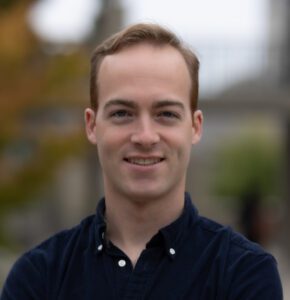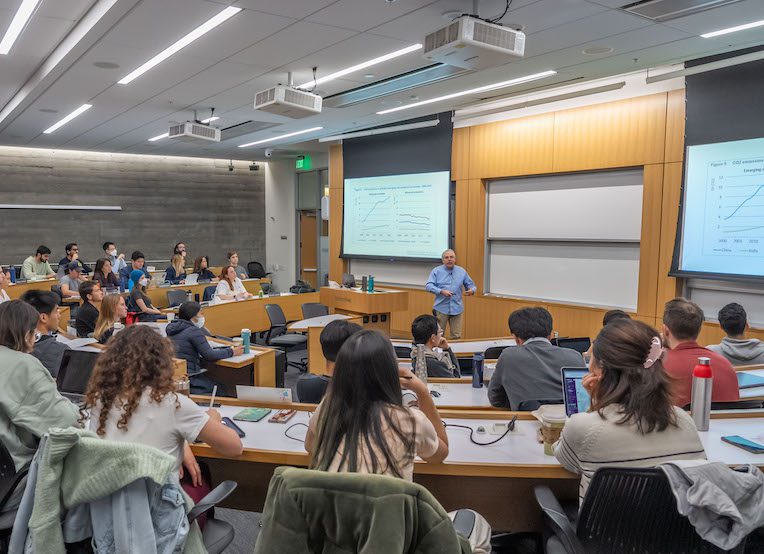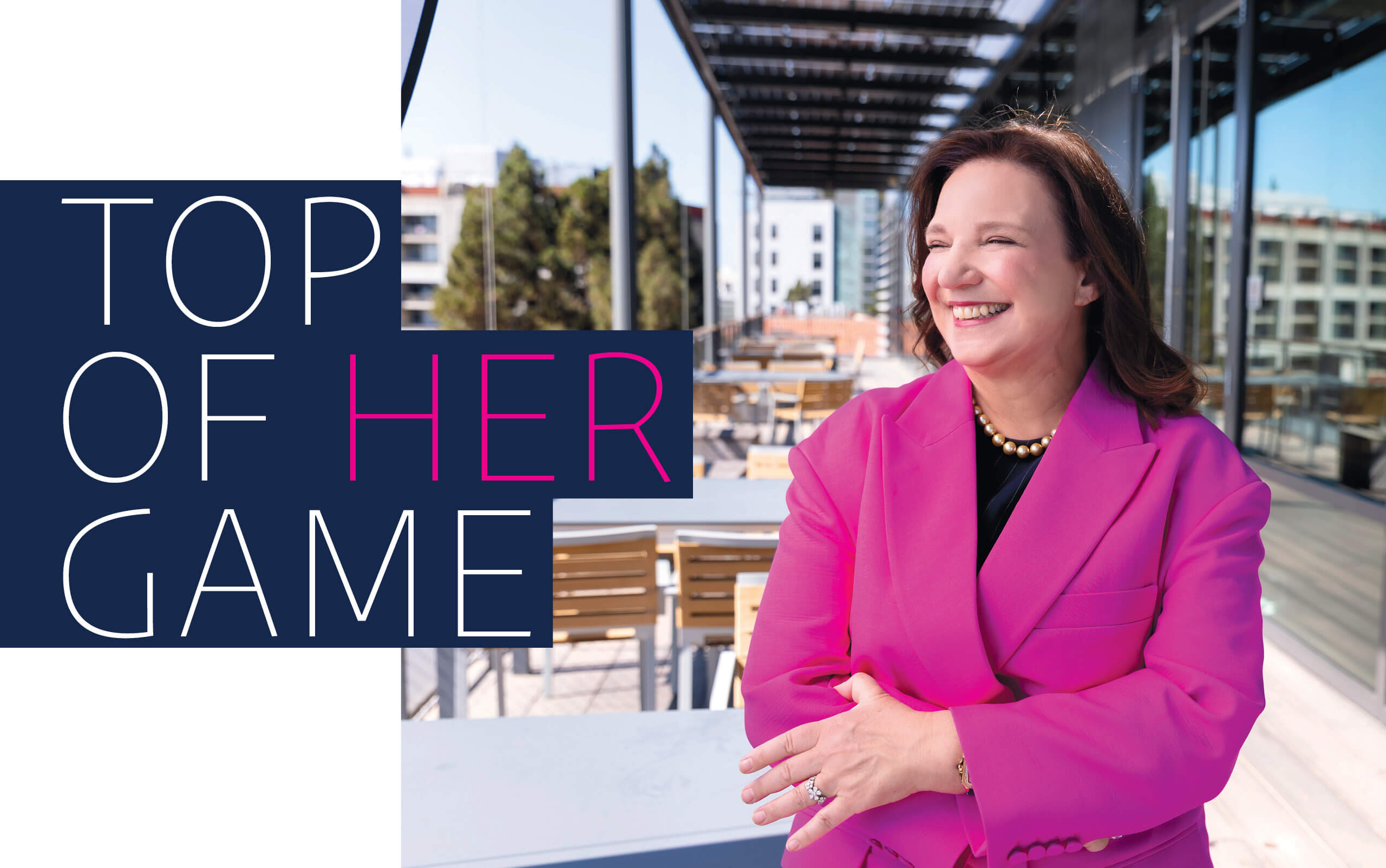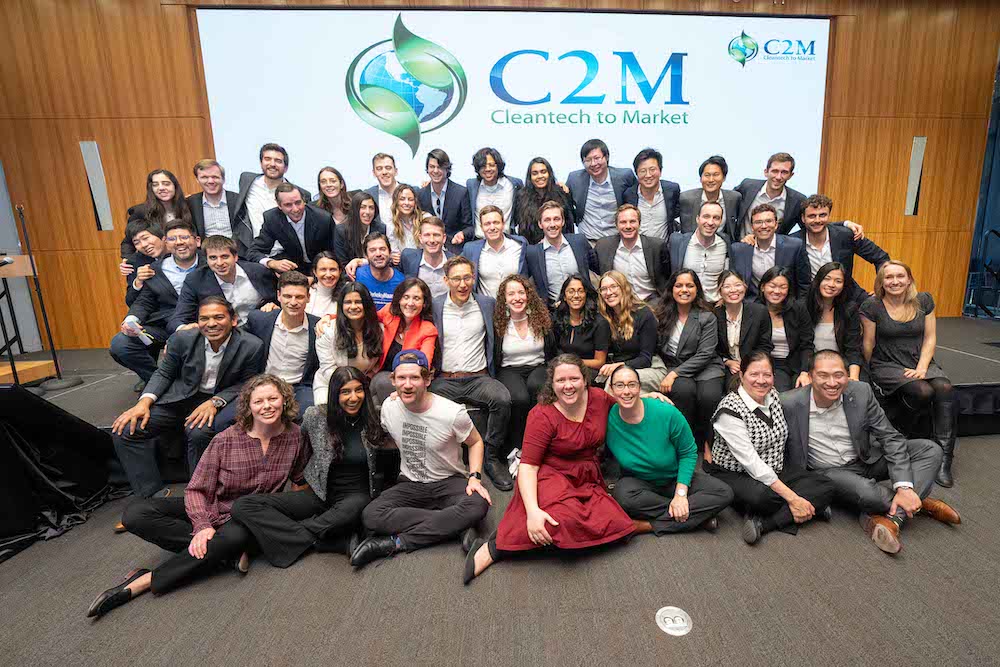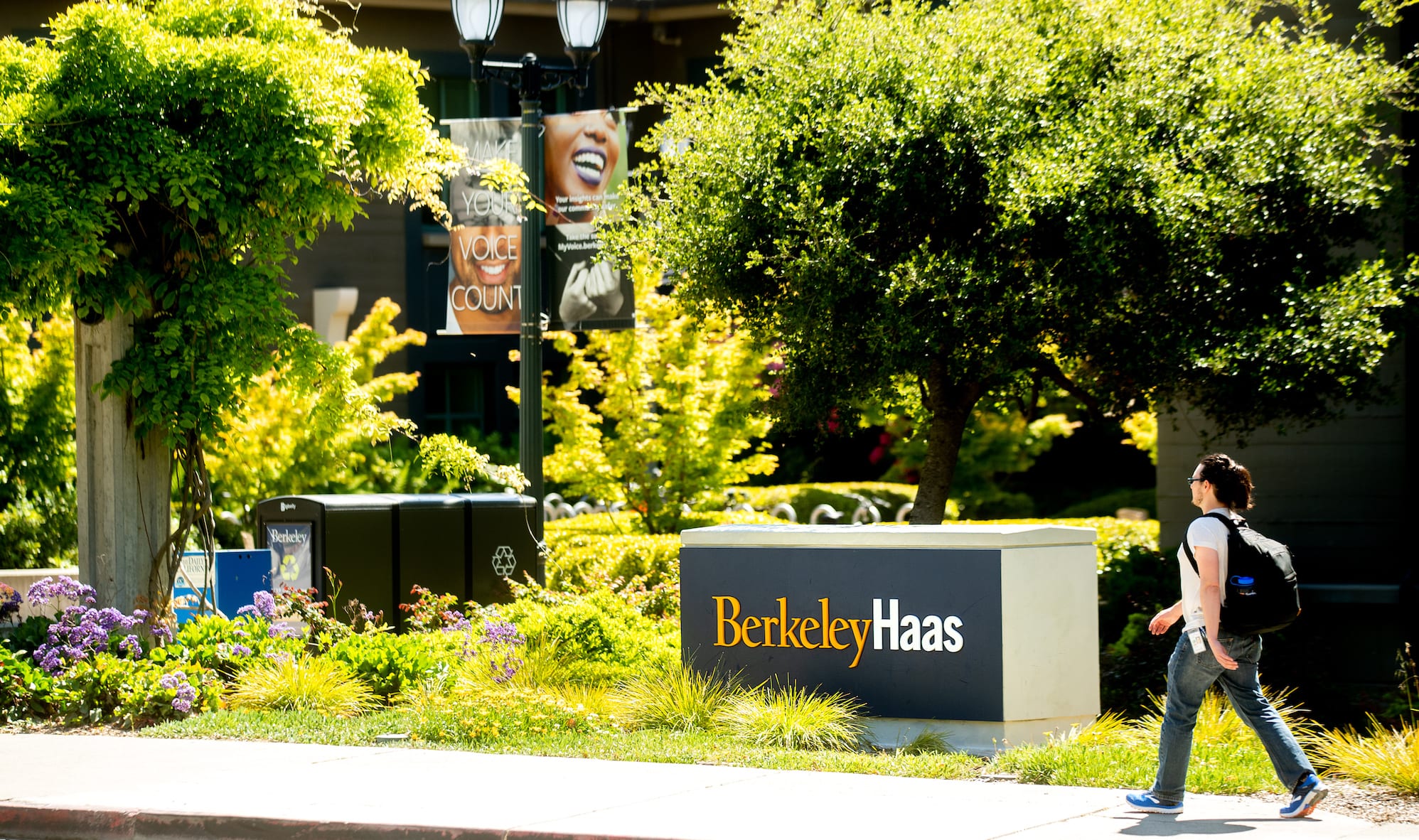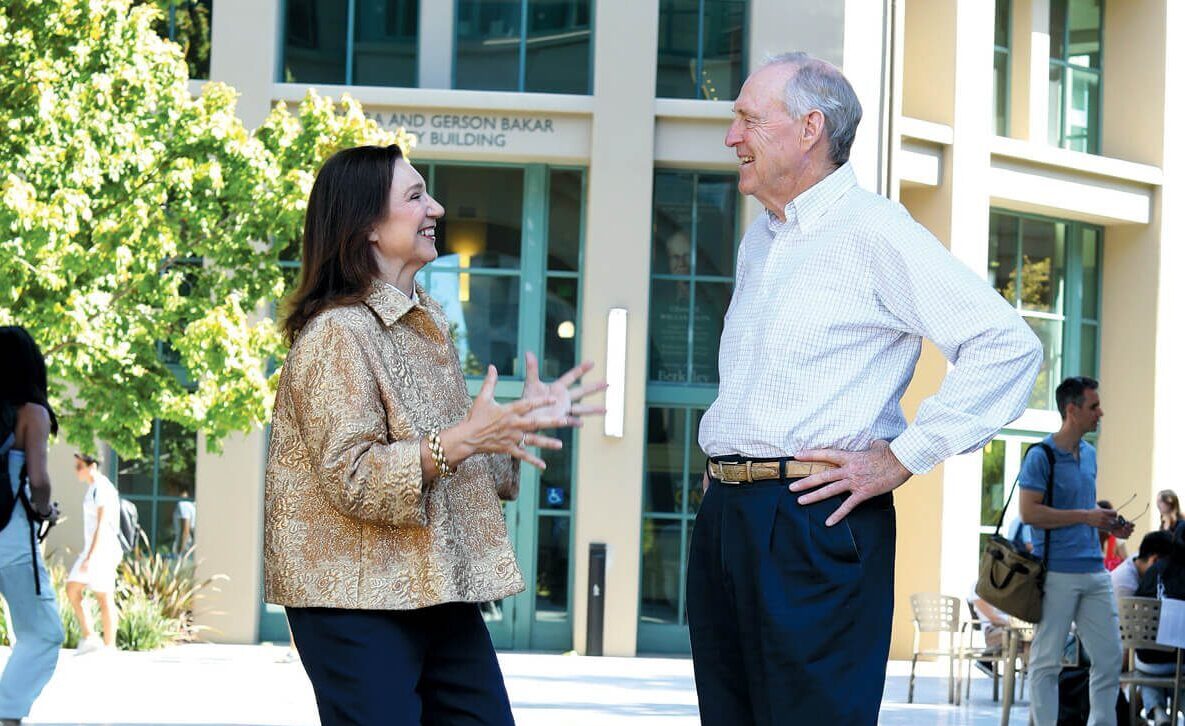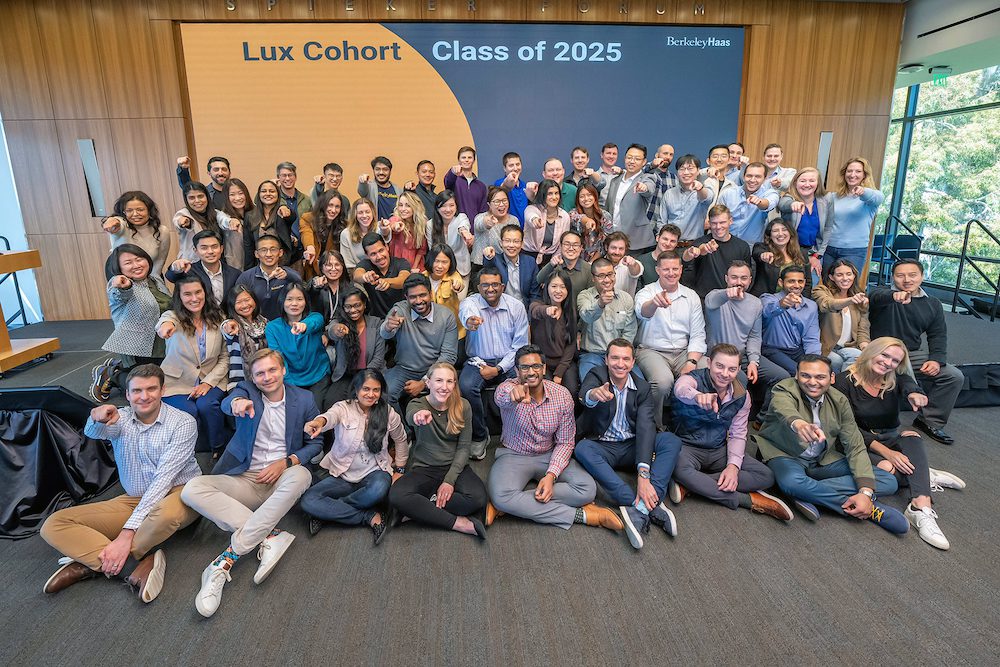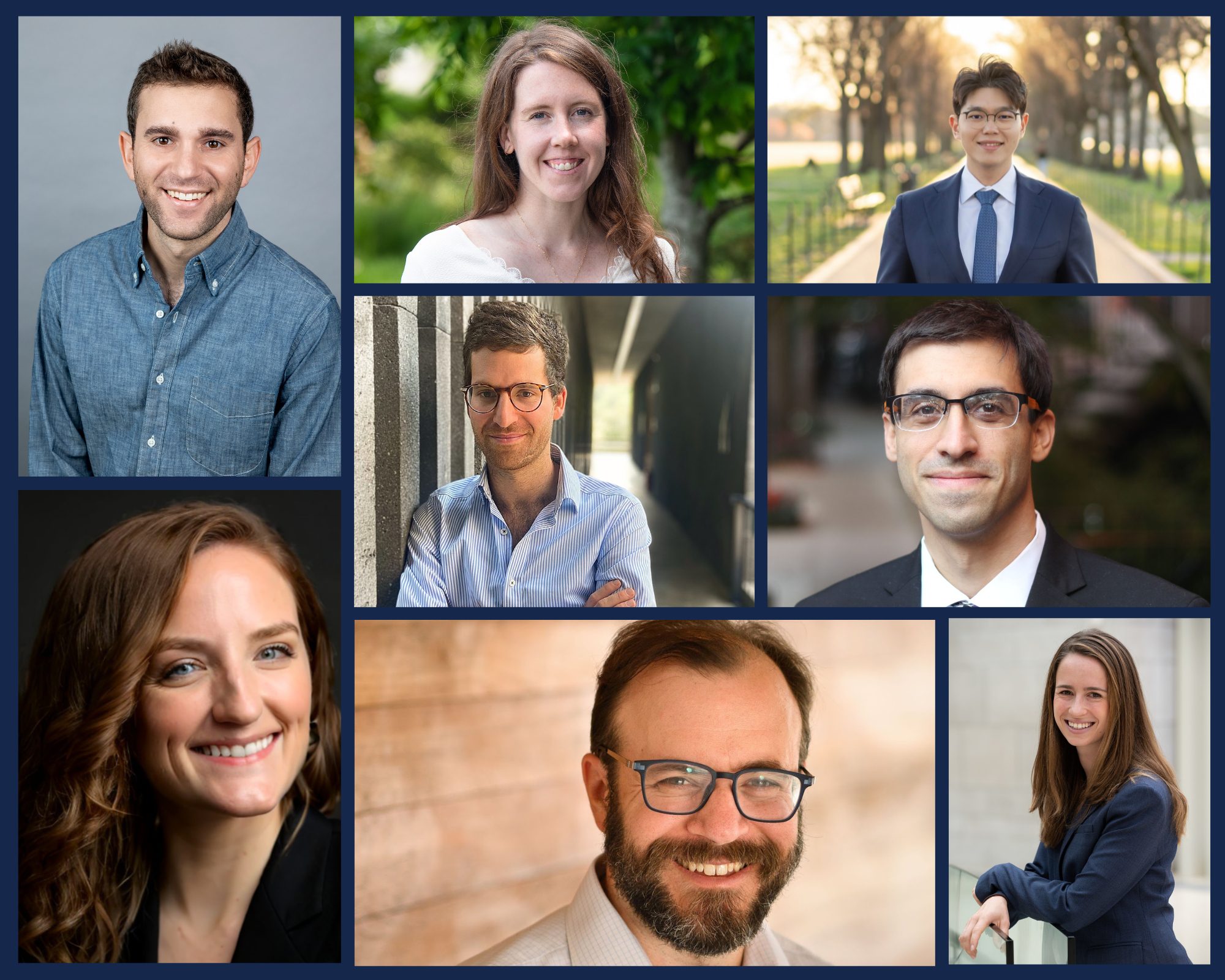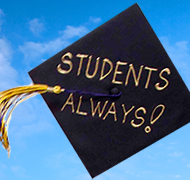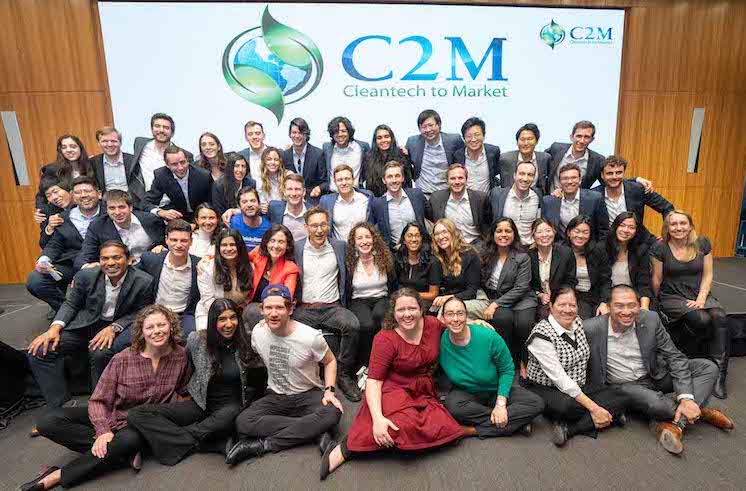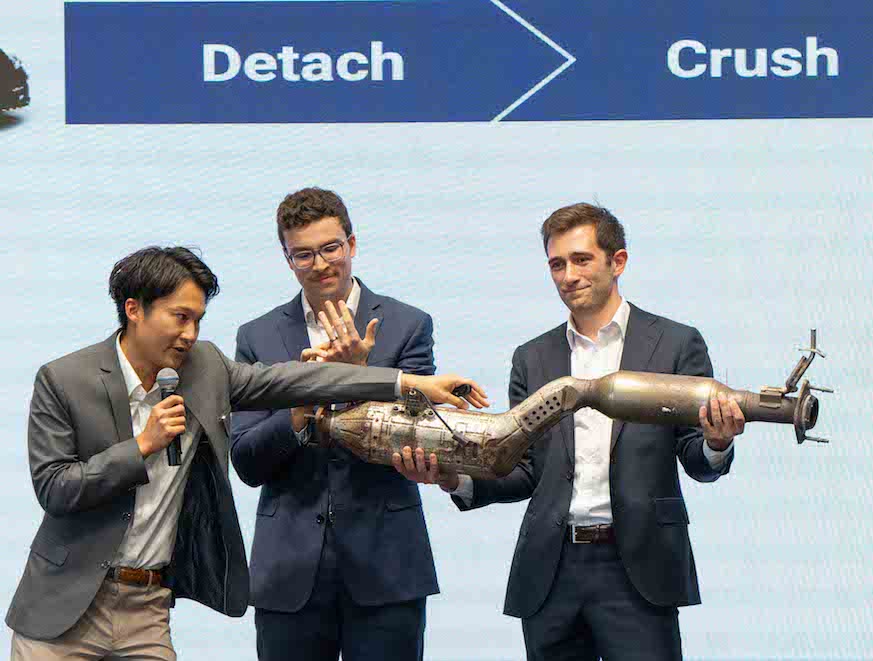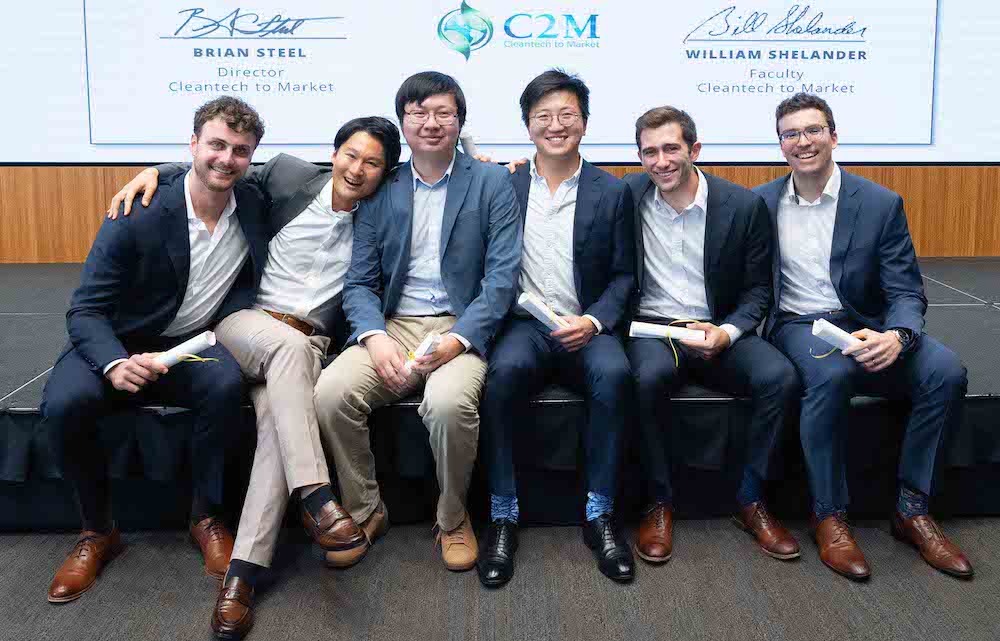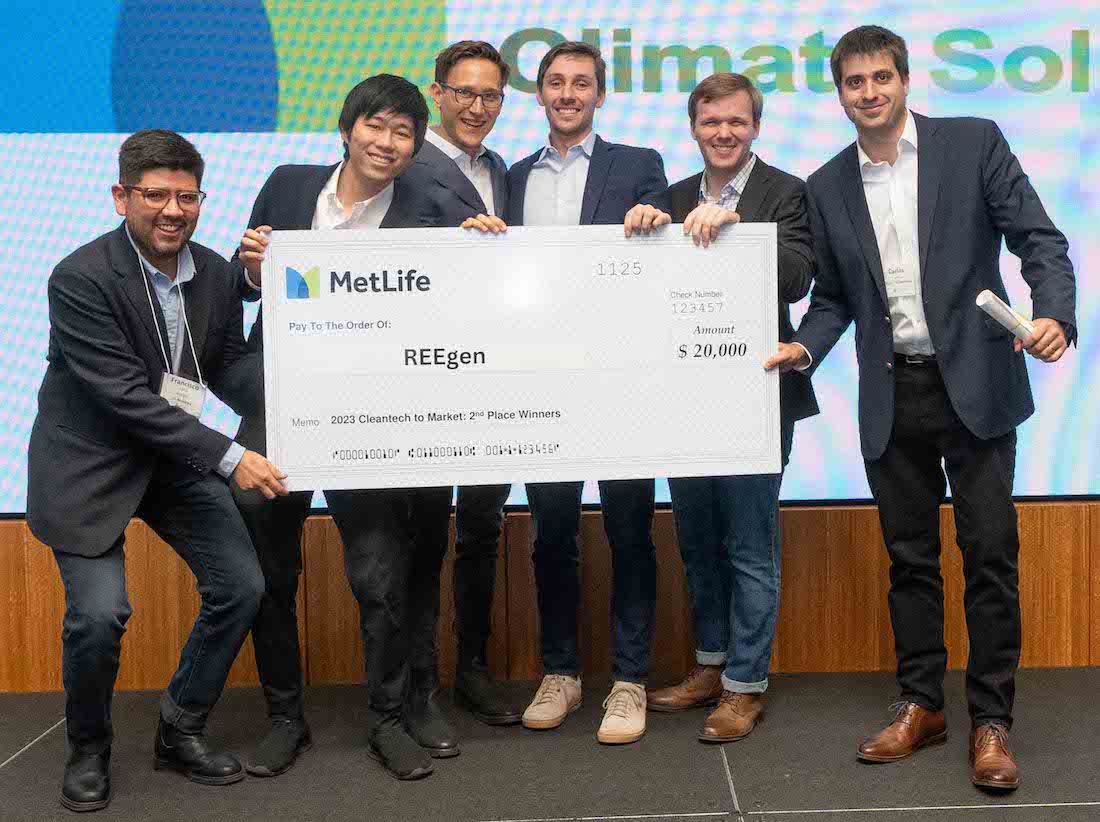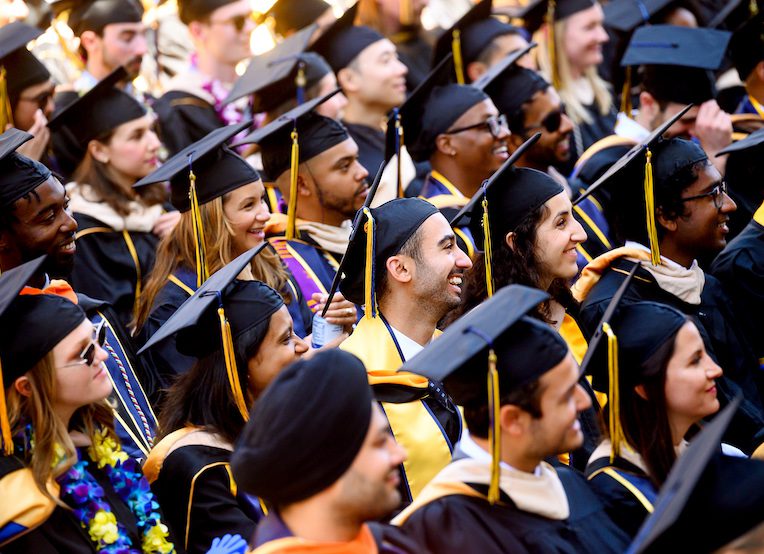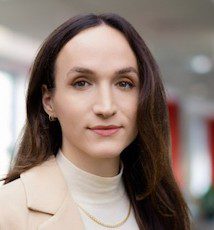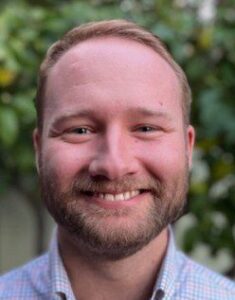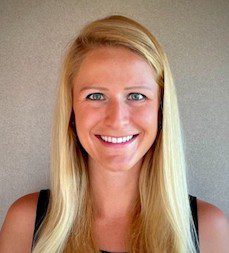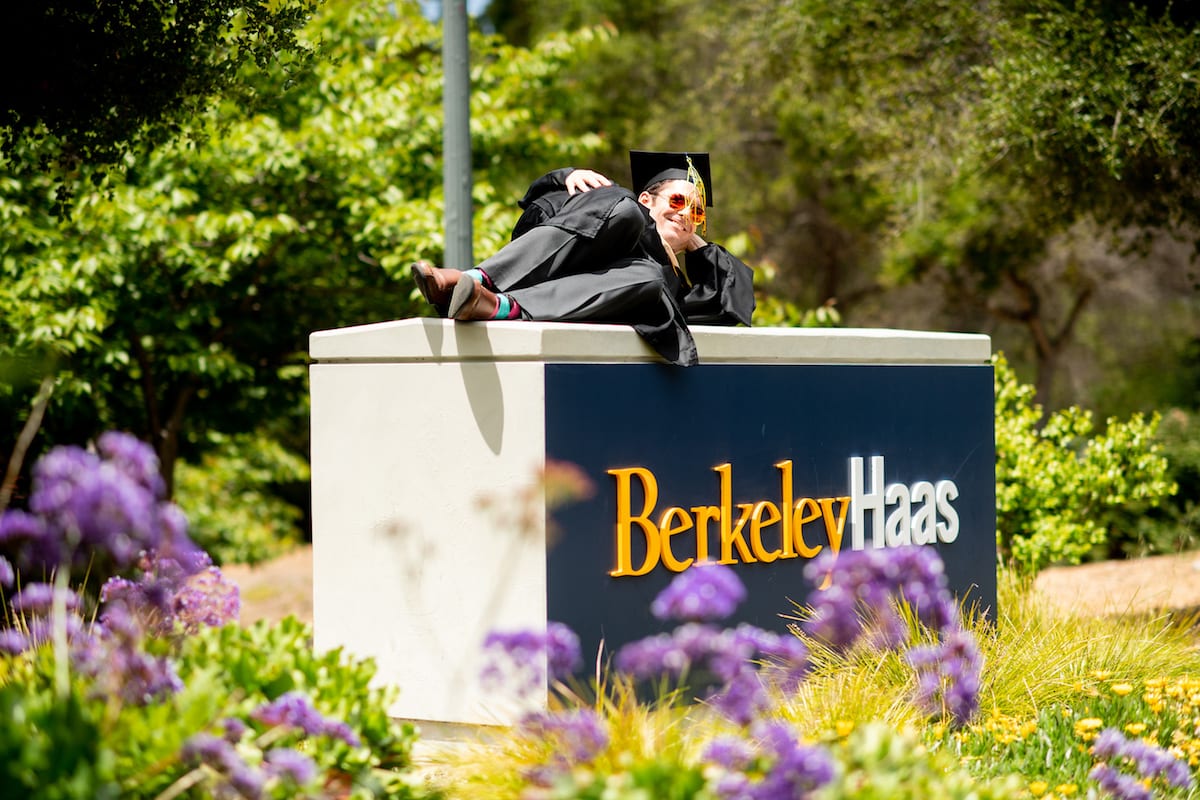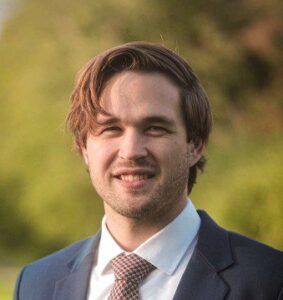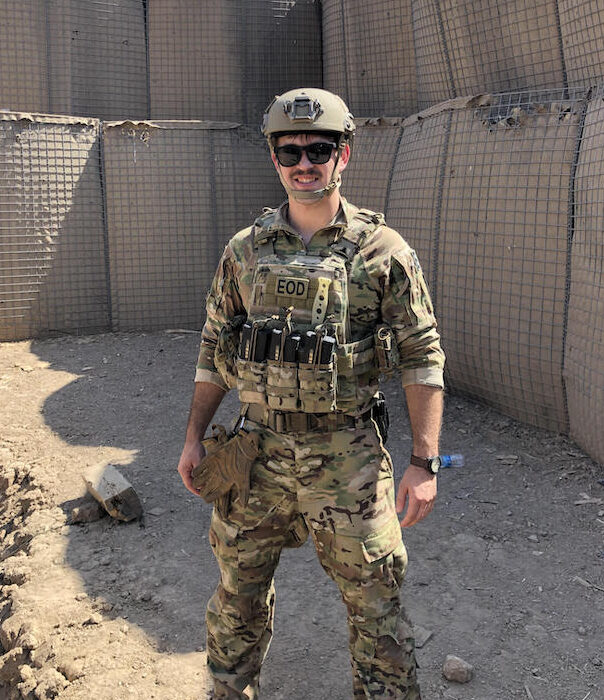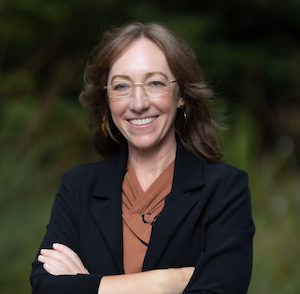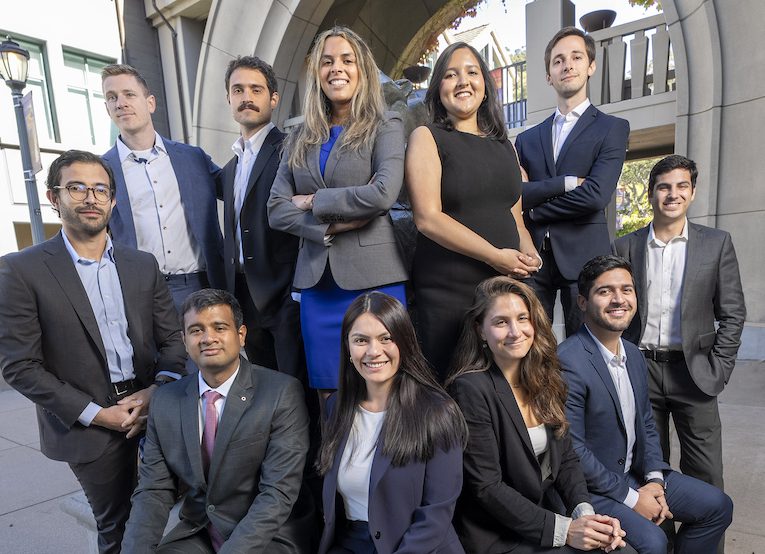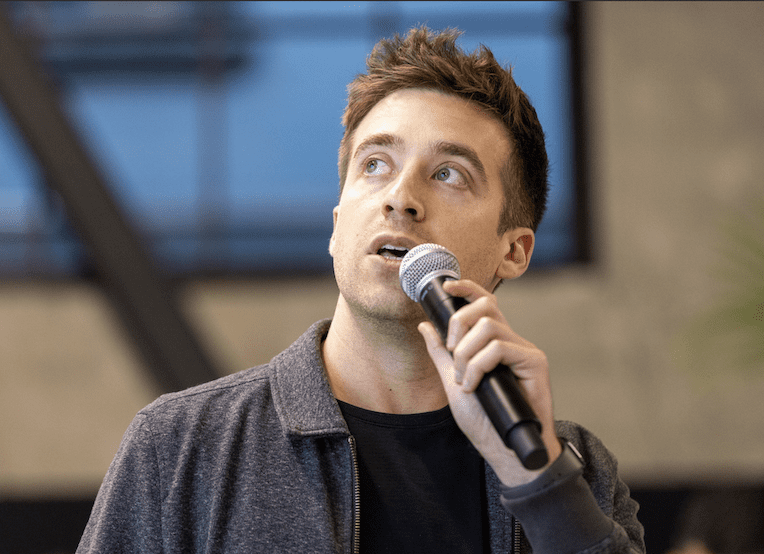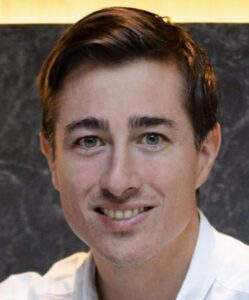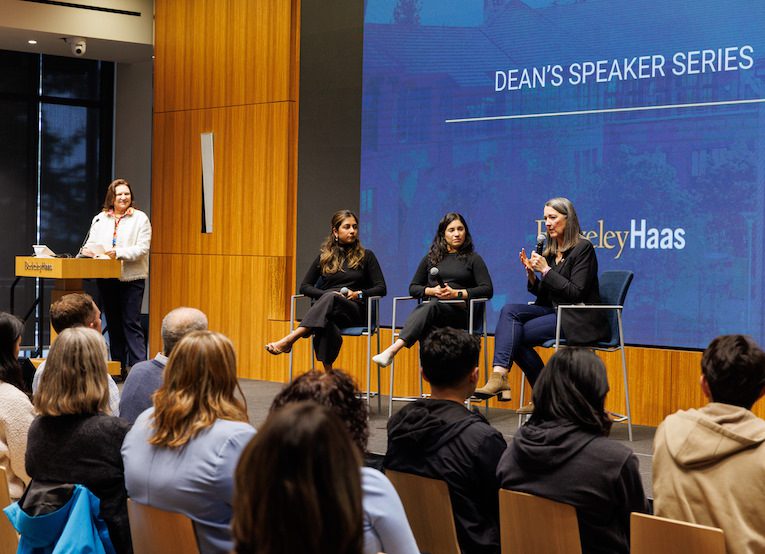
Patti Poppe, current CEO of PG&E and the first female chief executive to have moved from one Fortune 500 company to another, shared her extensive career journey at a recent Dean’s Speaker Series talk.
Long before she was leading California’s largest energy corporation to reduce its wildfire risk, Poppe got her start in engineering and production planning at General Motors. After 15 years of traveling around the world to learn various manufacturing techniques, she made the transition to energy by taking a job at DTE Energy in Michigan. From there, she went on to work in operations at CMS Energy, where she became the company’s first female CEO in 2016.
(Watch the DSS interview with Patti Poppe)
Poppe shared that, for a large portion of her career, she never imagined being a CEO. Having taken on challenging roles and working hands-on in the energy field as a front line supervisor, she was originally set on being a plant manager. In fact, it wasn’t until her own supervisor told her that she needed to aim “bigger” that she considered pursuing a career as an executive.
“I often say there’s two kinds of careers. There’s one that’s like a destination in mind, and there’s one that’s full of interesting assignments,” Poppe said. “Imagine a soccer field, and you have the goals on one end. You’re here at this goal, and you want to get to that goal. If you’re really clear about what that goal is, and if it’s CEO of a Fortune 500 company, the shortest path is a straight line. But it rules out a lot of interesting assignments because, as I was coming up the ranks, I needed to do very important things to prepare me to compete to be the CEO.”
She noted that this direct experience in the industry has been crucial for her to not only be able to lead successfully but gain credibility and trust among teams. But even with all of her industry and leadership experience, Poppe described PG&E as her hardest job yet.
Taking over as CEO amid PG&E’s 2021 crisis following the Dixie Fire, Poppe was faced with the challenge of rebuilding employee and customer trust in the face of negative press and feedback. By employing her own philosophy of “leading with love,” she emphasized community and invested in the workers who had stayed with the company through its darkest times.
“The team had been under a tremendous stress…and needed healing, so I knew love was an essential ingredient,” Poppe said. “A utility is a uniquely human kind of company. People often say we’re an engineering company or an energy company. I say we’re a people company, we are people serving people.”
With love as the “essential ingredient,” Poppe adapted a tool she learned while working in the automotive industry: lean manufacturing. She has since made this methodology—which brings visibility to company problems and helps individuals take ownership of their work—to her playbook to improve PG&E’s safety and efficiency. In the face of climate change, she noted that the company’s current goals are to invest in infrastructure that will be able to withstand future conditions, in addition to lowering energy costs for customers.
Poppe was interviewed by MBA students Paolo Gutierrez and Madhu Gupta, both MBA 24.
Read the full transcript:
– [Dean Ann Harrison] Good afternoon, everyone. I’m Ann Harrison. I’m the dean at the Haas School of Business. Welcome to this afternoon’s Dean’s Speaker Series. We are so fortunate today to have Patti Poppe join us. She is one of 52 women Fortune 500 CEOs. This is just so incredibly exciting. Patti began her career by using her engineering degree in production planning and engineering roles at General Motors. As she rose through the ranks at General Motors, she adopted her philosophy of lean management influenced by her time on the company’s global task team, where she traveled around the world to learn lean manufacturing techniques. She started working in energy in 2005, starting at DTE Energy in Michigan, and then she became the first female CEO of CMS Energy Corporation, which supplies electricity and gas to nearly 70% of Michigan’s residents. By the way, I had this incredible opportunity to hear her speak yesterday at a rival school called, I think it’s called Stanford. Yeah. And she told us that she feels much more comfortable in a hard hat than she does in a business suit, which is hard to believe. But she was really amazing talking about being out there in the field. So Michigan, 70% of the residents. As I was saying, through all these roles, Patti developed a track record of supporting renewable energy development and implementing a strong safety culture. It should come as no surprise that, after all this foresight and determination, that led to her appointment as CEO of PG&E—after PG&E had had all those incredible crises in 2021, she was brought in. Incredible story. Patti’s current company goals are to strengthen trust in PG&E by improving safety and embracing technology to put the company on a course toward cleaner energy. I was delighted to learn yesterday that Patti has her very own defining leadership principle, leading with love, and I’m sure she’ll talk about that today. Thank you so much, Patti, for taking the time out of your incredibly busy schedule to come and speak with our students today. Some quick housekeeping before we start: You should all have a note card on your seat. If you have a question now or anytime during the event, please write the question on the card. Please be sure to include your name and the program you’re in, and my colleagues will collect them for the Q&A portion of the fireside chat. So I’m now going to turn over today’s Q&A to Paolo Gutierrez and Madhu Gupta, and they will moderate today’s discussion. Thank you so much.
– [Interviewer] Hello, everyone. Thank you so much for being here, and thank you Patti for joining us today. We were just talking to Patti in the back, and she is so much fun. So we’re going to have a great, great hour with her. We want to start the conversation today talking a little bit about your journey, which Dean Ann Harrison just talked about. So you had a fun and fulfilling career in the automotive industry when you were working for GM, and then you decided to go into the energy industry. What prompted you to make that change, and how did you align that with your passion and your interests?
– [Patti Poppe] It’s a great question. I wish I had this really sophisticated answer to give to you, but I would say, and my husband by the way, and my mother-in-law is here. The original Pat Poppe is here. I have the privilege of having the same name as my mother-in-law and my husband, Eric. And just one other introduction, Laurae Campbell is here, who is a Cal grad, so give it up for Cal in my office every day. But my husband and I both worked for GM, and he still does, actually. But at that time, we had been moving around a lot, and we were about to move to Korea, and I had a friend of mine who had left GM and went to DTE Energy, and he just asked me if I would think about DTE, and I didn’t even know what they did. I was like, “What do they do? No, I’m moving to Korea.” Next thing we know, I got a job offer from DTE, and it gave us an opportunity to… We were moving around a lot, and we had young children. We had two daughters who were in, I guess third grade, and we decided to take a decision for the family and moved back to Michigan and plant what we thought were permanent roots there. Life unfolds in different ways. We didn’t know, at the time, that that was going to be such a consequential decision in our lives, but it was truly made for family at the time. And then, it turned out to be a great professional move, and I can’t imagine not having made that decision back then.
– [Interviewer] So many of us here are graduating in about a month, which is really sad. And with that comes big career pivots. So were there moments in your transition where you were questioned, or maybe you were questioning yourself? And how did you navigate those situations and kind of building that credibility in winning over others’ trust?
– [Patti] So many times, so many times. But I do think that, and this is a really important thing as you embark on your careers and continue your careers to really be able to find it in yourself to believe in yourself. And I remember this moment, my first day in an assembly plant. These are big factories. And here I was, this girl with a ponytail and my blue jeans. And walking down the aisle, I didn’t know where I was or what I was doing. And these guys pulled up in this golf cart and they said to me, “What are you doing here?” And I was like, now just freeze-frame for a moment. Like, in my mind I’m thinking, “I have no idea. Like how do I get to column number B80?” I had no idea what I was doing, but if I had said that, I mean, I would’ve lost all respect from these people. So instead, out of nowhere, I blame it on my high school math teacher. I feel like she infused me with confidence. And so, I just look at these guys, and I said, “I got a job to do. Don’t you have a job to do? Don’t you think we should get back to work?” And these guys go, “Oh, you want a ride?” I go, “Yes, I do. Can you please take me to B80?” And I just think about, like, don’t count yourself out. You walk in the room, every person in that room is wondering what they’re doing there. I can assure you, all of us have these questions about what’s happening. We don’t know as much as we pretend to do. And you just have to be honest with yourself, and it gives you permission, then, to actually admit when you don’t know and to ask for help and get support from people that you’re working with that do know more than you. No one’s going to expect you. They’re going to know you’re smart. I mean, you went to Cal, you went to Haas, they’re going to know you’re smart. But they’re going to expect you to want to learn more and learn from them. And so, one of the best ways to overcome not knowing is by being curious and learning from those that actually do know more than you do and let them teach you.
– [Interviewer] We were talking in the back how you’re one of two two-time female CEOs, which is amazing. But also, it means we have a lot of work to do. We’re curious to know, you went from a plant manager, you always loved working in the field, which is, it’s a tough place to be in. How did you kind of know that you were going to be in that CEO track, and then, that you wanted to be a CEO?
– [Patti] I was just thinking about this. There was a large part of my career I never would’ve imagined being a CEO. My singular focus was to be a plant manager. That was my dream. I had a great plant manager who I loved dearly, who made my life better because he was such a great leader, and I wanted to do the same for others. And so, all of a sudden, I was awfully close to that goal, and I was with one of our vice presidents, I remember, and he said, “Patti, what are your career goals?” And I said, “I want to be a plant manager.” And he said, “I have bad news for you.” I was like, “Oh, oh no, really?” He’s like, “You gotta think higher.” I was like, “Uh-oh, what do you mean?” I said, “I want to be a plant manager.” He’s like, “No, no, you’re too young. Like you’re going to be plant manager like in a year. You need a bigger goal.” And a blessing, at the time, I was in business school. And so, it gave me a time to reflect and imagine something beyond being a plant manager. And that was the first time I ever said out loud to anyone, like, “Maybe I’d like to be a CEO someday.” And I have to tell you, it’s really important at some juncture to get clear with yourself about what you do want from your career. Being a CEO is the most amazing job, but it comes with a lifestyle that you have to not think that you can skirt. I did really hard jobs to get prepared to do this very hard job. And so, being willing to make those choices, I often say there’s two kinds of careers. There’s one that’s like a destination in mind, and there’s one that’s full of interesting assignments. And I’ll just tell this real quick. When you have a destination in mind, it helps weed out choices. Somebody actually just said this today, and so, I’m going to use his story. Imagine a soccer field, and you have the goals on one end. You’re here at this goal, and you want to get to that goal. If you’re really clear about what that goal is, and if it’s CEO of a Fortune 500 company, the shortest path is a straight line. But it rules out a lot of interesting assignments because I needed to, as I was coming up the ranks, I needed to do very important things to prepare me to compete to be the CEO. Nobody ever promised me a CEO job, but to compete for that, and frankly, it happened sooner than we expected. The person I was succeeding got sick. And so, my HR person came to me and said, “You ready?” I was like, “Shouldn’t Dan do it?” He’s like, “No, you should do it, you do the job.” I wouldn’t say I knew I was ready, but I had prepared, and I had taken the tough assignments to get me prepared. But you can also have a very rewarding and fulfilling career doing interesting assignments. But it’s really important to know which you really want. And so, what I watch a lot of young people do, they make a mistake of choosing their own career paths and choosing these interesting assignments. And they may or not prepare you to compete for the job you really want. And if you all of a sudden find out you just spent the last 10 years doing stuff that isn’t getting you to where you want to go, you’ll be disappointed. So, doing interesting assignments, I had this friend Janet, who always had the most interesting jobs, but she got to this point in her career and she wanted to advance, and she didn’t have the requisite experiences, and she was disappointed. Now, if I might, my husband had no interest in being the big boss and managing a bunch of people. That was never his interest. He wanted to solve the toughest problems. And so, he always chose the roles that had the toughest problems, but that wasn’t necessarily going to lead him to be CEO of General Motors. He didn’t want that. And so, he was never disappointed with that choice. He was fulfilled by his choice of doing really interesting work all the time. I just don’t want you to make the mistake of thinking you’re on a destination path, but you’re actually setting yourself up for these kinds of interesting assignments. So my best advice on that is, study the people who have the job. If you have a destination in mind, first of all, be honest with yourself about that. Don’t apologize. Not everybody wants that job. If you are wired that you want that job, have that in mind. Then, study the people who have that job or similar jobs. and prepare like they did. Take the tough assignments, do those hard jobs that aren’t glamorous and aren’t going to get you on the cover of a magazine. They’re going to prepare you to compete for that top job that you’re really after.
– [Patti] Thank you. That’s really helpful advice for all of us graduating. I want to pivot a little bit to talking about PG&E. So you came to PG&E in 2021, and when you made that decision, you had the big task of fixing the company’s culture and operations. And in one of the interviews or speeches that I watched as I was preparing for this, you said that Larry Culp, the CEO of GE, called you the day after it was announced to say, you’re the only one with a harder job than me in America now. Which is—
– [Patti] That is a true story.
– [Interviewer] Very scary. Part of your strategy in tackling this challenge was bringing in the lean management methodologies and also your philosophy of leading with love. Why did you choose these two, and how did you get the stakeholders you coming in as a new CEO to believe in that and to take that culture and run with it?
– [Patti] Yeah, it’s such a great question. I remember thinking earlier in my career, I would look at these CEOs and wonder, “How do they know what to do?” And then I became one, I’m like, “Oh no, now I do actually need to know what to do.” But when I took the PG&E job, I did have the benefit of experience. And so, when I talk about preparing for these tough jobs, I had been the CEO of another utility. It happened to be a really wonderful utility that was performing very well but had had its own turnaround. And I had been present for it and actually led our customer trust transformation. We were lowest in customer satisfaction. And actually, in my time, we became No. 1, and I knew what that took, and I knew how to rebuild trust, and I had experienced really challenging turnarounds also at General Motors. And so, I actually knew what to do. And it’s a little uncharacteristic for me ’cause I consider myself a more participative leader. I like to engage the team in deciding the path. But we were in a crisis. We had just come out of bankruptcy. We literally had had four CEOs in the matter of a year. The team had been under a tremendous stress and catastrophe and needed healing. So I knew love was an essential ingredient. In business today, I think that’s too often we dehumanize it and turn work into a work-pay transactional relationship, and even companies as transactions, with our customers. A utility is a uniquely human kind of company. People often say we’re an engineering company or an energy company. I say we’re a people company, we are people serving people. The only difference between my utility and every other utility in America is the people who work there. We all have pipes and wires and customers. At PG&E, the only difference is the people who are there. And so, tapping into the human spirit of the people who work at PG&E and regaining their confidence in the face of a lot of negative press, a lot of negative feedback, people who had stayed at this company through our darkest days needed to believe in themselves and believe in what we were up to. So love was essential, but then let’s get some tools. Lean manufacturing is a wonderful system that I had deployed, I learned in automotive, but deployed in the utility for the 15 years or 20 years before I joined PG&E and had developed a playbook that worked to make problems visible, to bring out the best ideas, to help people own their work and their business. And we had a very important body of work to deploy. And that was our wildfire mitigation plan in 2021. We were still reeling from a series of significant fires and our bankruptcy, and an essential ingredient in the legal construct here in California is a wildfire mitigation plan. And so, I knew wildfire mitigation plan is the most important thing. And teaching lean, we can do those two things in the same way. So every time we went to the wildfire mitigation plan review, we were learning lean and doing the plan, doing the work, learning lean every time. In fact, I just had a meeting with my team today reminding us that every meeting we are in has two purposes: Number One, to teach our performance playbook; and Number Two, to do the work so that we can have a sustainable management system that teaches people at all parts of the company from the front to the back what it means to deliver excellence and improve our work every single day. And it’s working, I’m happy to report. We have reduced our wildfire risk by 94%. That is not a make-believe number. That is calculated by the risk exposure that we have. And the remaining 6% we’re improving every day and is backed up by our situational awareness, which includes, I have over 80 former firefighters who work for PG&E who help us mitigate our risk every day and respond when an ignition occurs. Cal Fire and the state of California have dramatically invested in their capabilities. We have 1,500 weather stations across our service area that’s from basically Oregon down to Santa Barbara and Bakersfield. Those weather stations have real-time data that communicates, we’ve divided the entire service area into 2-kilometer blocks. Real time, every minute of every day, we know the temperature, the wind speeds, the moisture levels. If there’s a tree in strike distance to the line, we know what color that tree is, we know how many feet it is from the line. We know the angle to the hill. We know the last time we inspected those. And we have a huge data engine that uses artificial intelligence to prevent the risk in every one of those 2-kilometer blocks. And we take operating measures and actions every single day, every hour of every day to make sure that an ignition, if it occurs, because electric equipment in fact does spark by design, we make sure that it’s not going to cause a catastrophic wildfire. That was delivered through our lean operating system.
– [Interviewer] That’s incredible.
– [Patti] Thank you from the PG&E plants in the audience.
– [Interviewer] So you are facing, day in and day out, the effects of climate change with wildfires, pressure on the grid. And as natural disasters continue to get worse, that’s putting pressure on your operations, which oftentimes means investing in better technology, better operations, safety management, and can lead to rise in prices. I think many of us here are going to be facing similar challenges as we grow in our careers and think about how do we make certain decisions. So how do you think about affordability in the utility sector while maintaining that commitment to investing in safety and sustainability? And how do you get the leaders in your company to follow your lead?
– [Patti] Well, first and foremost, it’s always about our customers, and we have to be willing to put our expertise to work, to make decisions on behalf of the people that we serve. And when we make a decision to make an investment, I’m going to make a pitch for the investor-owned utility model here for a minute. So if any of you have studied it or have questions about it, let me just tell you my perspective about this. The original formation of an investor-owned utility model was when we were building out this electric infrastructure for the first time because we were powering America and the world. And we needed to figure out how to get the most power to the most people at the lowest cost. And so, the investor-owned utility model emerged as a winning model because it spread the costs of the build out of that infrastructure over more people and more years by attracting capital from the capital markets and not expecting all customers to pay upfront for the build out of that infrastructure. And over time, as that investment and use of then, that product grew, the unit price declined. So in the original days we were building out infrastructure, and every year the unit price of electricity was going down. Well, now we’ve reached the stage that we have to replace that infrastructure for two reasons: its age, and two, our changing climate conditions. Our infrastructure was not designed to withstand the extreme drought, wind, floods, this is a worldwide problem. And so we have to, at this juncture in our nation, invest in that infrastructure, and then make it safe under future climate conditions, not today’s climate conditions, and all the while reducing carbon emissions so that we can thwart the speed and pace of climate change. Now, here’s the great news. A lot of people are worried about this. They think it’s just going to be too expensive. Well, one of the best things is the confluence of decarbonizing through electrification. While we are building out this new infrastructure, actually, we’ll grow load just like we did way back when growing load while we’re making these investments, thereby lowering the unit cost of energy as we go forward if we do it right. But annual expenses and maintenance, continuing to only do maintenance, it’s like owning a car. You can’t continue to Band-Aid the problem. There’s a point that you reach where it’s more expensive to continue trying to maintain the car than to invest in a new car payment to spread out the cost of that new car over time. It’s the same idea with our infrastructure of all kinds, bridges, roads, but particularly the electric grid. And the benefit the electric grid has is new demand. Electric vehicles, building electrification, decarbonizing our economy can in fact be done at a way that it lowers household spend on energy. Electricity is a more efficient fuel than gasoline, and we can then transition from natural gas to electrification. We’re going to be proving all this out here in California first. PG&E is at the heartbeat and the forefront of delivering this future and showing that it is possible. And thankfully, California is not going to get weak need about this. It’s going to be a major issue politically across the nation. And fortunately, California will stand our ground. And PG&E is essential to that clean energy transition, decarbonizing our economy at the lowest societal costs. And I could not be more excited to lead the team at PG&E to make that happen.
– [Interviewer] That’s incredibly helpful context, Patti. Thank you. Before we shift gears to talk about the future of energy, let’s discuss some of the challenges that PG&E is facing today. As we all know, decarbonization has been a major goal for PG&E. What is the biggest hurdle you see to achieving your goals, and how do you hope to combat these challenges?
– [Patti] That is a great question, too. I’d say there’s two big hurdles. One is our willingness to believe as a society that it’s possible. And that’s, again, why I’m excited about California. I think there’s a lot of people who want it to be true but don’t know the path. And we get to show the path, we get to show the world that it is in fact possible. And I had dinner just not too long ago with the Secretary of Energy, Jennifer Granholm, she and I go way back. It’s a very interesting twist of fate that she was governor of Michigan, and we passed really important energy legislation when she was there and I was at running a utility. And so, we go way back, but she and I were having this conversation that there’s a whole lot of people who talk about this subject, and there’s only a handful who are actually going to do something about it. PG&E gets to do something about it. You need us to do something about this. So my biggest concern is that people will back off, or get afraid, or it’ll become too politicized, and we won’t make the important investments in the infrastructure so that it’s possible. And then two, there’s going to be a lot of behavior change. We’re going to need everybody’s help to make this change. In fact, we’re mapping out our net-zero plans for the state and for when we get real and we’re like, “OK, what are we going to do to meet San Jose’s net-zero 2030 goal?” That’s a million people are going to have to have electric heat. How are we going to do that? That’s a big human behavior, actual challenge. We’re going to have to convince people that it’s in their best interest to switch fuels and to drive an electric car. And 2030, hello. Tik tok, that’s six years from now. So, all that to say, we have a lot of work to do, and so, do we—time is not on our side, but really I think when any great innovation happened and when we built this grid out in the first place, people had to have faith that building this infrastructure was going to be worth it. And I don’t know about you, but saving the planet feels like a pretty darn good reason to make a change. And so, we’re all in.
– [Interviewer] Absolutely. I couldn’t agree more. Now, like in any industry, utilities too needs to adapt their business model and their strategy to evolving customer preferences. And we are interested in how you are navigating such shifts. Specifically, what is your view on decentralized energy generation and microgrids, and what is the subsequent impact to your business model?
– [Patti] Yeah, well I think we have the benefit of the distributed energy resources that exist in our system, but we today are blind to them. And so, they are not optimized. Our energy system today is not optimized. We’ve got big bulk power and distribution equipment and transmission equipment that is designed for that big bulk model of delivering the highest volume at the lowest cost. It’s like the big Walmart of energy. The grid is just a big centralized system by design. Plugging in all the distributed resources has been done so far very much to the benefit of the individual at that premise. We now need to fully leverage the benefit of those distributed resources. And the only way to do that is by complementing them with storage, both bulk storage and localized storage. And if we can store that energy that’s produced, we have too much energy produced in the middle of the day today in California, it’s way more than we need. And so, adding more generation capacity at noon is a waste of money. We need to add storage resources. If we’re going to invest in something when we look at the system as a whole, invest in the storage resources so you can store that energy at noon and then start to spread out supply and demand and start managing demand for the first time ever. We didn’t have devices until now. The energy grid has been a demand taker just by definition. By definition, the grid that we’ve all lived with all our lives has been built for peak demand plus, say, 15%. We’re now at plus 22%. So peak plus 22. In California, it’s about five days a year that we come close to that peak. Every other day of the year, we have way more power, and the whole system is way bigger than it needs to be. We have the chance with increasing demand to more fully utilize those existing resources, actually optimize demand in the form of EVs. First dynamic load we’ve ever had. Air conditioning comes on when it’s hot, lights come on when it’s dark. There’s not a lot of choice to that. Refrigerators run all the time. Those are the three biggest users of electricity today. And then factories. Run when the factories run. We have the opportunity to charge cars at the right time and then discharge those cars on the peak. Today, on our roads in PG&E service area, we have 6,000 megawatts of capacity in the form of vehicles. That is three of my Diablo Canyon Power Plants of capacity driving around the roads today. If we could only turn that power around to the grid, they’re not designed for that today. But the newest EVs, the Ford Lightning, the Cadillac LYRIQ, some of the other Cadillac products, or the GM products coming out, are bidirectional. That’s going to be both a supply and a demand on the grid, but we’re going to have to optimize all those resources and optimize the grid. And I just think that’s going to take the most innovation that this industry has seen in our lifetimes.
– [Interviewer] Thank you for sharing your perspective on this topic. Now, not so long ago you mentioned that PG&E is in the people business, and I loved that. So just to talk a little bit more about that, I think one of the bigger responsibilities we have today in the transition to clean energy is to make sure we bring everyone along. Now, of course, lower-income communities may not have the same access to programs, incentives, or resources perpetuating maybe energy poverty and environmental injustice. How do you as a leader, and PG&E as an organization, empower vulnerable populations and make sure they’re not left behind in this transition?
– [Patti] This is one of the things that we spend a lot of time on. Another pitch for the investor-owned utility model, our obligation to serve, which is the law is actually a privilege. It’s a privilege to serve and assure that no one is left behind. If we had, whether it’s small local companies that don’t have the scale or profit maximizing companies that are purely motivated for maximizing profits without an obligation and a privilege to serve, you can imagine that people would be left behind. So when we advocate for the right kind of pricing for distributed energy and specifically rooftop solar, when we are advocating for the right price, this is why we are doing that. I think, a lot of times, we get painted with a brush that we’re anti-solar, we are anti-solar, we are anti-no-one-left-behind. We are anti-cost shifts. Today, there’s a $34 a month cost shift from people who don’t have solar to people who do. So people who don’t have solar, most likely apartment dwellers, people who can’t afford the upfront cost to invest in distributed solar. They are getting left behind, and we are fighting hard to make sure that doesn’t happen. And the CPUC made an important proposed decision in the last week to add a flat rate to the bill to more accurately distribute the costs, not new costs, but the existing costs to people equally so that anybody who uses the grid should pay for the maintenance of the grid and pay their full freight. We would’ve argued that might have been more, should have been applied, but it’s a good starting point to try and get the cost allocated properly so that no one is left behind.
– [Interviewer] Thank you. It’s really encouraging to hear PG&E’s efforts toward a more fair and just transition. Looking ahead, of course the world overall is changing at such a rapid pace, and for businesses to tackle climate change effectively, it needs to be a concerted effort that requires collaboration. However, one might argue that the energy ecosystem is not set up for collaboration, starting with the fact that we have such a fragmented power grid. So I’m curious, Patti, how do you see collaboration between public, private, and cross-sector entities evolving as we continue to put pressure on our grid?
– [Patti] It is one of the most important ingredients. You’re completely right about that. When I knew I was coming out to PG&E and started imagining my time at PG&E, I was so excited about the access to the innovation and technology that exists here and the privilege to serve the Bay Area and Silicon Valley. I mean, any utility in America would be proud and excited to serve the customers that we get to serve. And so, I started engaging in the innovation ecosystem here. And I got very resounding feedback. And it was this, “Patti, PG&E is killing us death by pilot.” They would say, “Wait, how many pilots do we have to do?” Like, it’s crazy. We’re a little company, we can’t afford to do all these projects to prove ourselves. We don’t have the funding to do that, so we took a completely fresh look at how innovation can plug into our system. And what we realized is that often people have a solution, and they’re hunting for the problem as opposed to having a problem and finding the right solution. So we came at it to say, my team looked at our 10-year strategy and our clean energy plan, and they came up with 70 problem statements that defined the gap from where we are today to where we want to be in 10 years that we can’t solve by ourselves. And we held an innovation summit last year, and we invited the world to come help us solve these very specific 70 problem statements in a variety of areas. Wildfire was one, but 24/7 decarbonized energy was another one, how to transition the gas system was another area, full utilization of EVs. And so, we put out all these problem statements. Three thousand people joined us that day, which I was so stunned and excited. We limited the in-person to 300, and that filled up in like a day. And Elon Musk spoke at our event, which people really felt like that was the big news that he makes news everywhere he goes, which was fine with me ’cause we wanted to make news that day. But the real news, what actually happened that day that was so important in addition to all of these innovators getting access to PG&E and being able to realize, “Here are the problems that need to be solved” and matching their technologies, their ideas to the problems that we had, we made an announcement with Schneider Electric and Microsoft that we were launching the first distributed energy resource management system on the cloud with these incredible technical partners and would be the first company in the world to be able to optimize all these distributed resources. That was actually the news that mattered that day. And since then, we had 300 submissions and 60 finalists, and we’re narrowing down to 50 to figure out how to partner with each of these technologies that are ready to scale. And we’re not going to invest in the companies, but we’re going to be their No. 1 customer, which every startup needs both. They need seed capital, but then, they need a great customer. And so, it’s a really great role for PG&E to play.
– [Interviewer] Awesome, thank you. And now, as our final question. Given the context in which we’re living in with the shift toward sustainable energy systems, the need for resilience in the face of climate change, and of course, the imperative to address equity along the process. I’m sure you see both innovation and setbacks on a daily basis. So with that, what keeps you up at night? What keeps you going, and what are you most excited about as you think about the future?
– [Patti] Well, there’s no doubt safety is what keeps me up at night, the safety of my workforce, and the safety of the communities that we serve. And so, we put a lot of effort around that. And I think about it all the time, and we have systems that have dramatically improved the safety. But of course, I think about it all the time. What was the second one?
– [Interviewer] What keeps you going?
– [Patti] Oh yeah, what keeps me going? Oh, the people of PG&E that I have the privilege of working with and the customers that we serve. I mean, I just love what we’re doing. We know that we are changing and changing that culture and leading with love has been such a galvanizing force for us. And it’s been just a real challenge, but a lot of fun. And then, I’m excited about being able to deliver on this clean energy transition for the world. I truly believe that we are at ground zero here in the Bay Area in California to show the world that it is possible. And there’s a lot of people who have been working at it for a long time, and maybe they’re getting tired, and there’s a lot of opposition that’s drumming up, and we just can’t lose our faith. And I am thrilled to be able to be at the place where we’re going to do something about the world’s existential challenge.
– [Interviewer] Thank you so much.
– [Ann] Thank you so much, Patti. Thank you so much also for being willing to take questions from the audience. So the first question that I have here is, “What sacrifices have you had to make in your personal life? Do you ever question or wonder if prioritizing your career is worth it?”
– [Patti] So I get this question often in a variety of forms. I’m not going to let my husband answer it, by the way, but I will give you my version of the answer. And we were talking about this in the green room a little bit. I subscribe to a Japanese philosophy called Ikigai, and if you haven’t seen it, study it, because I wish I had studied it in my early days. But yeah, I’ve made choices in my career that have been very demanding on my time. But the four elements of Ikigai is, first, you obviously want to do work that you can sustain your family. So you want to get paid for that work. I think a lot of people, and especially many of you at this juncture in your life and in your career, please don’t stop at the place that pays you the most. You will surely miss by just focusing on getting paid for what you do. You want to get paid for what you do, but it doesn’t matter whether it’s the most, what you want to combine it with are three other elements. So yes, get paid for what you do, but do something that you’re good at. Do something you love, and those two things might not be the same. You can often be really good at something, and maybe you don’t love it, but that will parlay into and open doors for you to do what you love, and then do something that the world needs. And so, for me, I can look at my career in all my years. I was always doing something that I got paid for but that I was good at, and I learned new things and discovered new things. But I had the privilege of loving being in an operating environment, seeing the daily heartbeat, seeing what we could deliver, just really doing something important and knowing at the end of the day that we did it. And then, especially now at this point in my career, to do what the world needs means that my minutes at work and my minutes at home have full value all the time. I’m fulfilled in all my minutes. And what a blessing that is. And I would wish that for each and every one of you that you find your path, and it’s not going to be anybody else’s definition of that path for you, only, and you have to study yourself. What do you love? What do you do in your discretionary time when no one has asked you to do it? What kind of articles are you clipping? Which podcasts are you drawn to? Pay attention to that, know that about yourself, know what you love, bias your career choices to that which you love and that what you can be good at. And then, please promise me you’ll find something that the world needs, and you’ll throw yourself at it. You’re too smart and too talented to not make a difference in this world. And so, I really have high hopes that you, too, can live the blessing of a career that I have had that has not felt like a sacrifice but has felt like a continual opportunity to grow and learn and make a difference.
– [Ann] Thank you so much for that. Absolutely wonderful advice. This question, you mentioned a career of interesting assignments. Can you speak to some of your more interesting or assignments that may not have seemed so at the time?
– [Patti] Oh, that’s really good. Yeah, I can think of one in particular that comes to mind. First line supervisor. It was interesting, that’s for sure. I tell people it was the second-hardest job I’ve ever had. The job I have is the hardest job I’ve ever had. But second-hardest job was first line supervisor. And I had a career choice. I had an opportunity for a promotion, and a company car, and daylight hours, and all these things, get out of my boots and get into a suit, and maybe that would be good. And I had a boss who pulled me aside and said, “Patti, wait, wait, wait. You haven’t been a first line supervisor yet, and if you want to be a plant manager on that soccer field, you’ll have gone around a key experience.” And he said, “And someday you’ll be standing in front of a room full of people that you are leading, and they will know you didn’t do it. And you might get the job somehow, but you won’t be good at it.” Plant manager. I was like, “Oh, dang it.” So I turned down the company car, and I took the second shift trim shop supervisor job. It really sucked. But I learned so much about people, and about leading, and the union tricked me and all these things. I learned so much. And so, yes, it was very interesting, and no, there were moments I did not love that darn job. But I look back now, and it was a key pivot point. And so, don’t take the easy route. Take the tough jobs where you’re going to learn the core business that you’re in. Understand that whatever business you are in there is a core business about it. Building cars at General Motors was core business. And now, in a utility, having operational experience and understanding what it’s like to lead people, I just stood yesterday in front of a group of first line supervisors who had just graduated from a yearlong development program, and I could swap stories with them. Do you think that gives me credibility as their CEO to be able to talk shop with these guys? Yes, it does. And when I say guys, it was men and women, gender neutral there. But I think that, sometimes, you take the tough job on the pathway to a destination because you have to learn the business, and you need to know how it works and why it works on the ground floor, so you can lead it well.
– [Ann] Thank you for that. How do you handle the daily stress, the wildfires, the CPUC, the unions, the shareholders, the employees, the budget?
– [Patti] There is joy in the journey. No, I do have coping mechanisms. One of the things, this did happen, I was probably six months into this role, and the big difference about this role versus all the roles I had had before was truly the life and death aspects of it. And how, in the early days when I had just arrived here, how uncontrolled it felt, and the risk of another catastrophic wildfire was real. And it was scary. And I was about six months in, and I just was trying to come to terms with the, as I called it, the death and destruction of all of it. This isn’t like a normal quarterly earnings update CEO job. And it occurred to me, it was more military, and we have a four-star admiral on our board. And so, I thought, “Why hadn’t I called Mark?” So, I called Admiral Ferguson, and I said, “Mark, what am I supposed to do with this, all this destruction and risk?” And he said this, he said, “Oh, Patti darn it, I should have given you this talk earlier. I give it to all my young commanders.” I’m like, “Good, I’m not young, but please give me the talk.” So he gave me the talk, and the talk went like this. Two key elements. Number one, the standard is not perfection. He said, “do you know it is safer today because you are there. And because we were implementing this lean operating system and creating visibility to the key wildfire mitigation elements, and we were making progress every day and we had brought order.” I knew I had brought order to what felt like disorder. I knew it was better. It didn’t have to be perfect, it just had to be continually improving. That was a big relief. And then, he said, “Every great mission in history,” and he had studied all great military missions, and he had studied them all, he said, “had one key thread. They had a leader who refused to give up. You cannot give up. You will have setbacks, things will go wrong, bad things will happen.” And there are things that have happened on my watch that I would definitely wish had not happened. “But the standard is not perfection. The standard is progress, and you have to be tenacious, as we say, we cannot give up.” And I don’t know what it was about that talk, but it took the weight of the world off my shoulders. And he also said, he said, “In that environment, when you know you’re making a difference, and you don’t give up, that’s when real leaders thrive.” I thought, “OK, this is me thriving. I am thriving.” And I had to remind myself that I was thriving. And some days are harder to thrive than others, but you just have to believe that you matter, and I have to believe that we can do it.
– [Ann] Wow. Thank you so much. That’s great advice. So this question, and I think you already answered it, so you feel free to skip to the next one if you’d like. “How do you prepare PG&E for the massive infrastructure investments in the future while still delivering satisfactory returns to shareholders?”
– [Patti] Oh, I don’t think I’ve answered this. Let me answer this one because I think this is a really commonly misunderstood feature of investor-owned utilities. Our customers deserve better service. And again, like I said, we get to spread the cost of that service out over time by attracting capital from the markets. But one of the things I didn’t mention about our investors, who are the investors? Our investors, and investors in a utility, are not like high-rolling, fat cat profit-driving, maximum return investors. These are pension funds, teachers, firefighters, police. They turn over, they’re nest egg to a fidelity, or a J.P. Morgan, or whomever, American Funds, and they choose us to invest in, and then we shepherd their dollars by investing in this infrastructure and promising a reasonable return, not a maximum return. it’s a regulated return. We have oversight. People decide what is that return here California, we have formulas that determine what that return is. So there’s no shenanigans associated with it. It’s formulaic, and it’s designed on a reasonable return for the risk of investing in this infrastructure and doing the work. And it’s on a very actual small portion of the elements of a customer’s bill. Only about 10% of the bill is actually our profits. And so, that return to that investment community, those moms and pops, I am unapologetic about keeping our promise to those investors. They’ve entrusted to us their life savings. Of course, we’re going to provide a return that we promised, and at the same time, improve the service to our customers by making the right infrastructure investment choices and reducing the cost of doing that, improving our performance with our lean operating system and our performance management playbook. We reduced costs out of our business in a dramatic way. We’re starting to set ourselves apart from other utilities, and our ability to extract cost out of the system and accelerate our investment and make the system safer, faster. And so, there, for me, there’s no land where there’s a conflict between delivering for customers and delivering for investors or shareholders. The system is designed to deliver for both. It’s actually a unique place in the world where you can have win-win. And I find it very fascinating, there’s a lot of people who are trying to make this into a win-lose discussion. It’s not win-lose. I don’t have to pick one or the other. I can pick both every single day and know that we’re doing right by both.
– [Ann] Thank you so much for that. This is the last question. “Do you find that you have leveraged your non-PG&E and field experience as the CEO of PG&E and how have you done that?”
– [Patti] I think so because I love the work that we do, and I love being with our crews who do that work. And so, I love going out to our power plants, and our hydro facilities, our distribution teams, our gas teams, our electric teams. It’s my happy days when I get to go out and be with the team in the field. And I think it does two things. It gives me credibility with our team, so they can, I would say, for the first time in a while, trust the leadership of the company and be willing to adopt a change in their culture because they can trust their leader again. And so, because I think, in fact, my board chair when I took this, or when he was talking to me about joining the company, and I asked him, “Is this like a financial turnaround? The company just went bankrupt, is this like going to be a lot of bankers and spreadsheet turnaround, or is this like a fundamental culture and safety turnaround? Because if it’s a finance turnaround, I’m actually not interested. If it’s an operational turnaround, and if we get to change the way we do our work, and if we need to, and the case is that we need to build a safety culture, then I’m in.” And he assured me it was an operational and cultural turnaround, and he was right. The money follows. When we perform, the money follows. But I just think that the idea that I can do this kind of work, and my team knows that I love the work that we do for the sake of the work and serving our neighbors, our friends, and our families, I think I get a lot of street cred with the team because of my true demonstrated experience and passion for what they do.
– [Ann] Thank you so much for that. So there are going to be refreshments at the back, but first, I just want to thank you so much for coming here to Berkeley Haas.
– [Patti] Thank you for having me at Berkeley Haas.
– [Ann] Yeah, we’re just so impressed.
– [Speaker] Working? Can you hear me? Before you guys go for the refreshments, Patti did want to take a selfie.
– [Patti] Thank you. Thank you.
– [Speaker] Everybody in the back, kind of like…
– [Patti] Come on. Come to the middle. Come to the middle. We’re going to do an aussie. Come to the middle. Get right in here. You stand in front of me. Stand in front of me. I didn’t want you to fall off the stage. OK. Everybody ready? Say Berkeley Haas.
– [All] Berkeley Haas.
– [Patti] Thank you so much. Go there. That’s right.
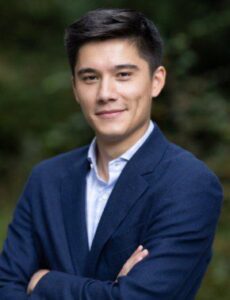

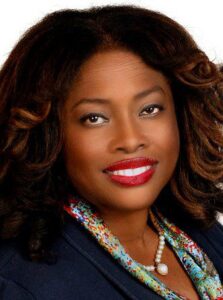
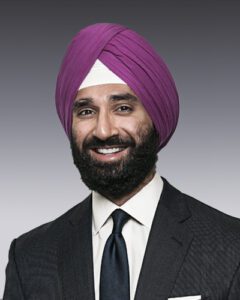
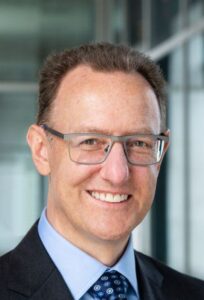
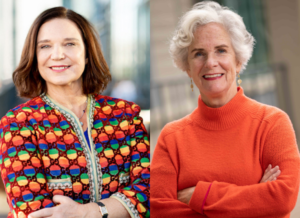
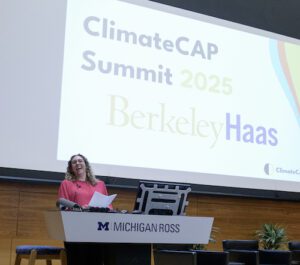
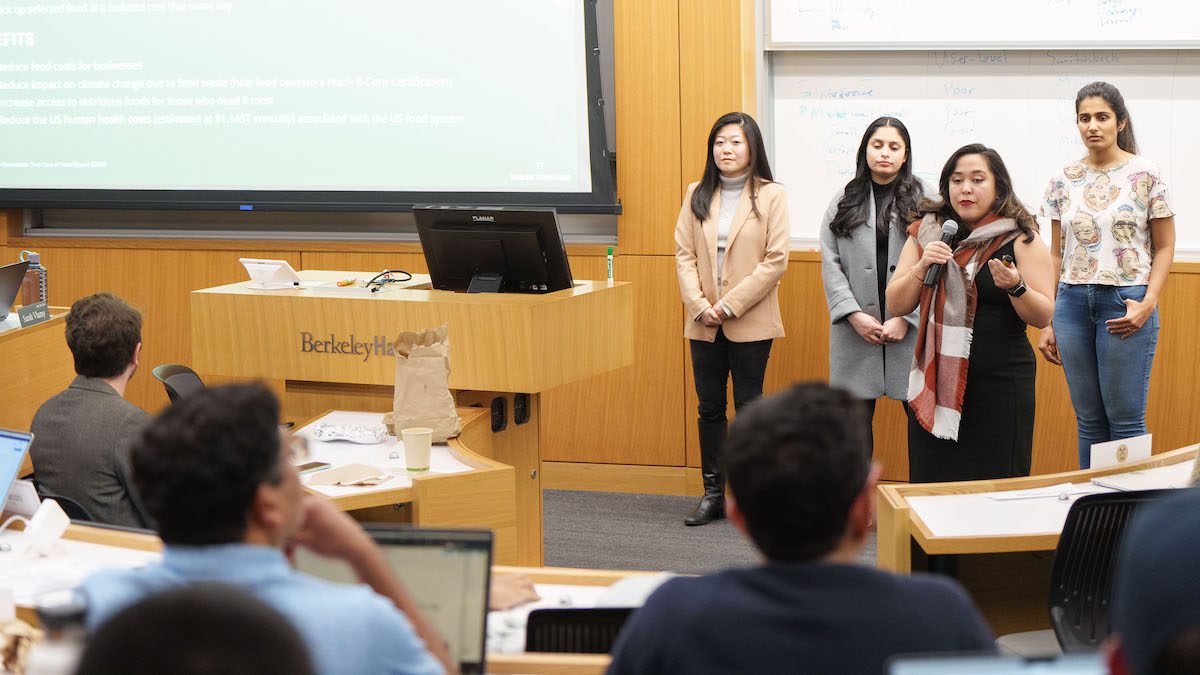
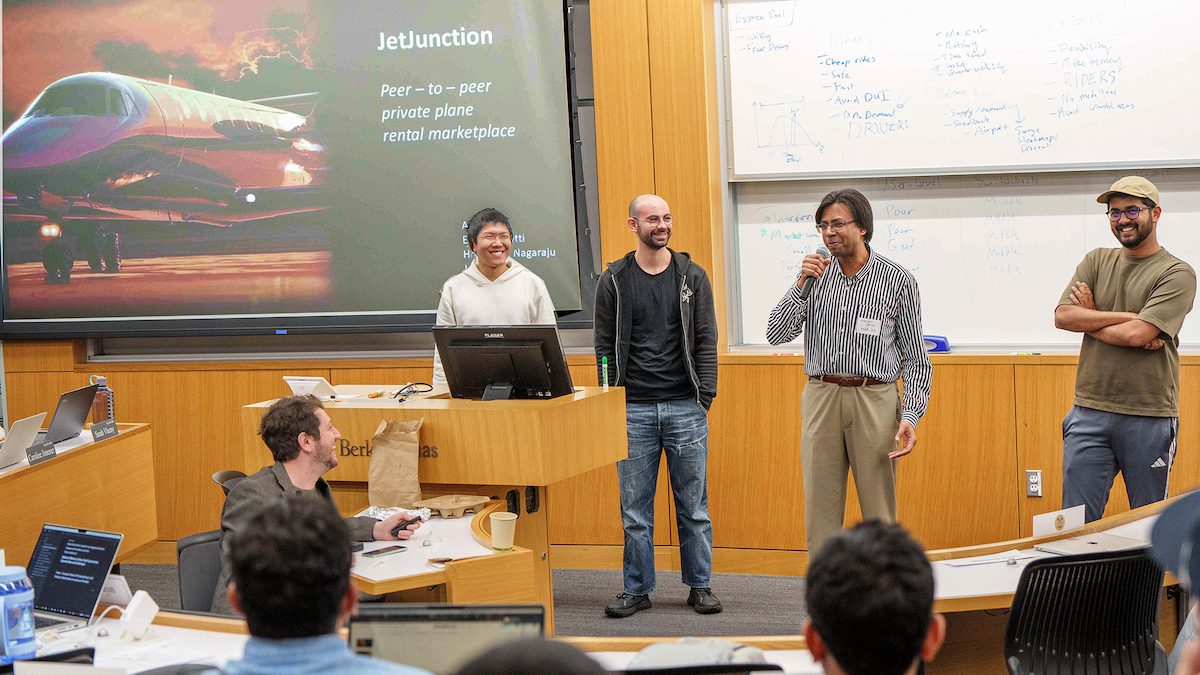
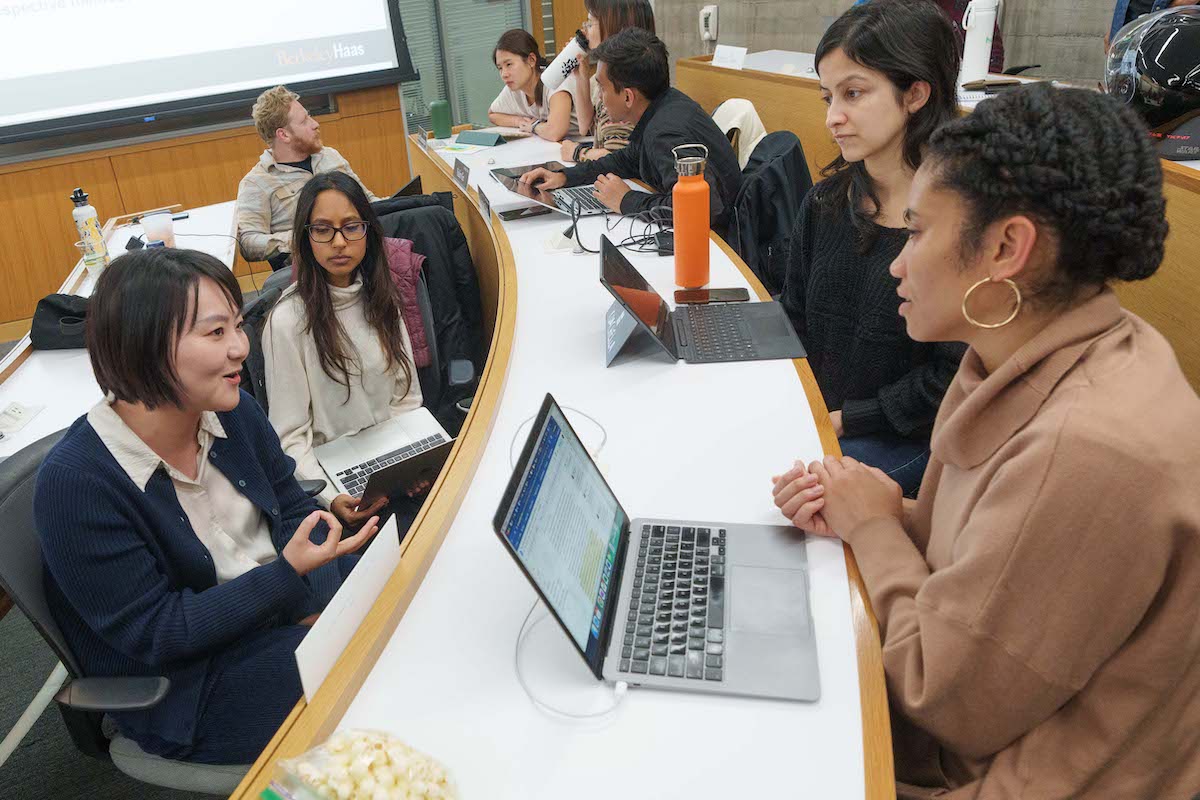
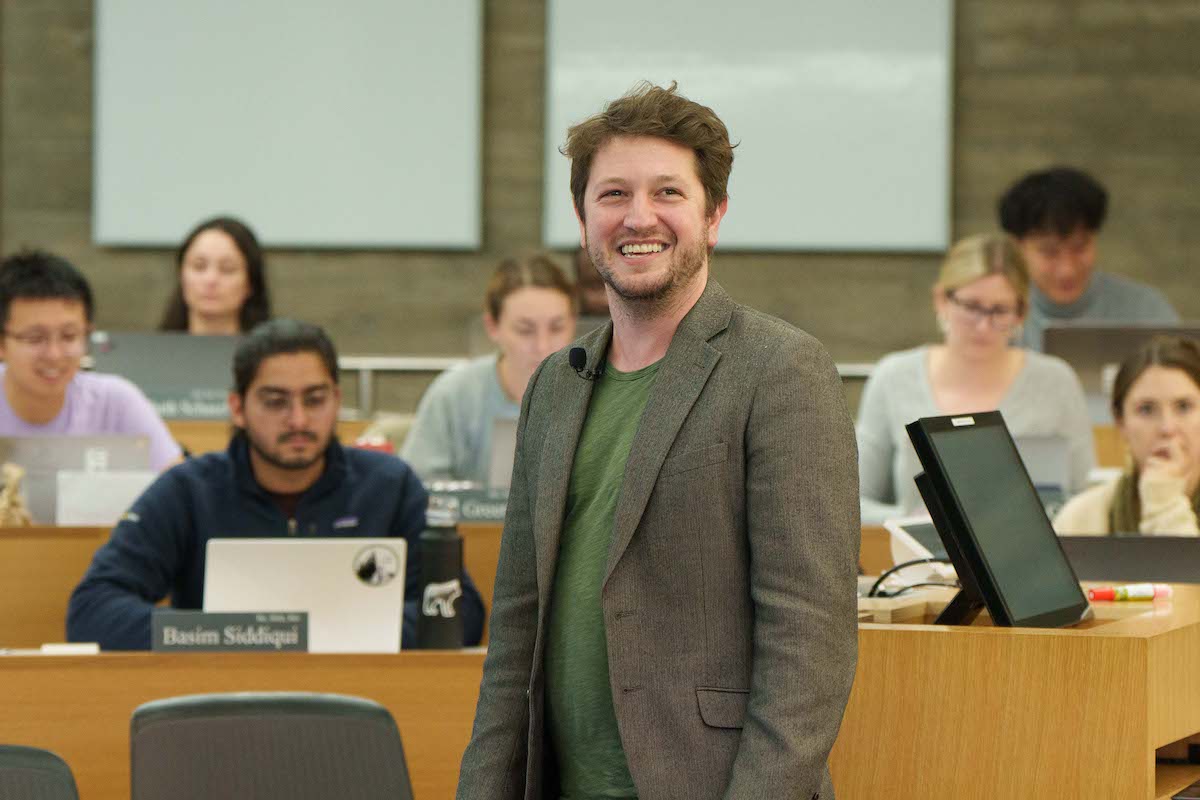
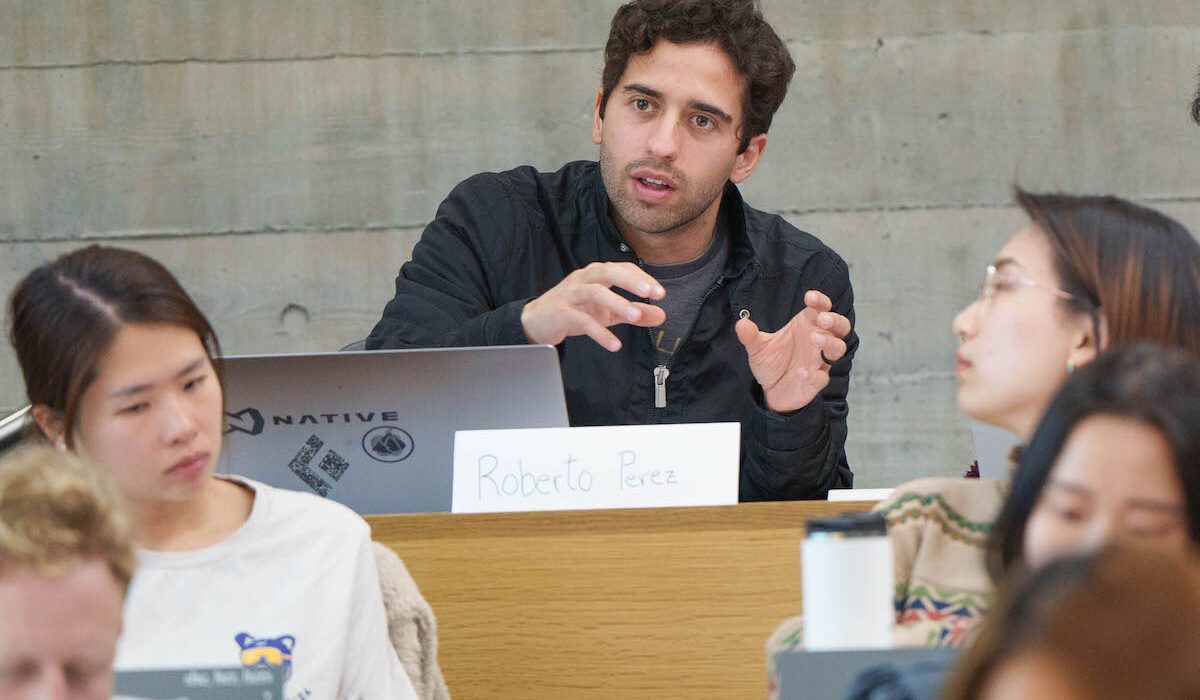
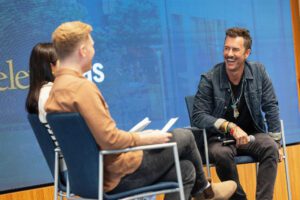
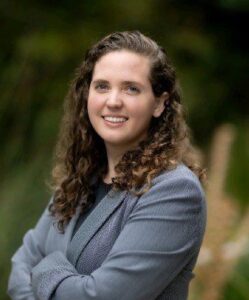
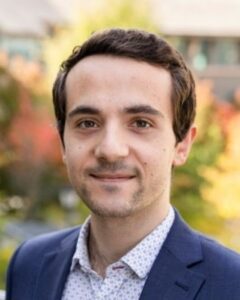
 At a time when the world—and especially the job market—is full of uncertainties, it can often seem impossible to rise above the challenges many women face, from the workplace to their personal lives.
At a time when the world—and especially the job market—is full of uncertainties, it can often seem impossible to rise above the challenges many women face, from the workplace to their personal lives. 